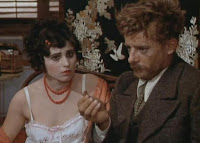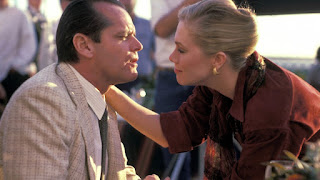In this film, Tunin is sent by anarchists on a mission to
kill Benito Mussolini and he receives help from the influential prostitute Salome
who knows (in the biblical sense) various members of the political elite
including the guard responsible for the dictator’s security trail. With the
inside scoop and details combined with sharpshooting skills of Tunin, this
looks like the perfect team to carry out and execute the assassination plot.
And yet, it gets messy. Tunin is internally struggling with
the fact that this event could and would most likely and most probably lead to
his death. But he is driven by a desire for revenge. This is briefly shown and
alluded to at the inception of the film where Tunin is visited by an older
friend who tells him of his plan to free the people by killing the ruling
dictator but later ends up being killed by the military. This enrages Tunin,
and he sets out to exact revenge on the main and principal source and agent at
the top, Mussolini the head of state himself.
In the brothel, he is aided and guided by Salome who has not
only her own vendetta, that is, the death of her to-be husband but also her
intense personal hatred towards the Fascists. From the onset, Tunin, on the
other hand, is less driven by elaborate political ideology but rather it
becomes a matter of personal importance to him. His friend should not have died
in vain. When Tunin ends up falling in love with Tripolina, one of the working
prostitutes, he finds himself in a conflict between his desire for love and his
desire for loyalty and vengeance.
This is intensified by his upbringing as simple and
average-looking country folk with freckles and very limited experience in
terms of love and lovemaking. At the same time, Tripolina herself has had her
own share of suffering, and as a sex worker, she seems to have given up any
hope of love and romance. Deep inside, she feels not worthy of love and so is
confounded by this unusual and unexpected attention that she receives from
Tunin who is not solely interested in her body but also in her mind, soul, and
overall well-being. and happiness.
As she finally lets down her guard, she becomes vulnerable,
as does he in the name of love. In a moving scene, Tunin who has lost his head
and heart to this young woman shows up one morning burning with jealousy and
pushes away one of Tripolina’s prospective clients while agreeing to pay the
brothel owner to be and spend time with his beloved during her regular working
hours. In this way, he prevents her from being with someone or anyone else. Tripolina
then asks for two days off as they are planning to spend some time together.
She does not know yet what is awaiting her at the end of this brief vacation.
As they spend time together roaming the city, walking
through parks, and dining at restaurants, she is spotted by one of her
customers. He makes fun of their innocent romantic date and then he lets his
female companions know about them, and they whisper and gossip about this
seemingly odd couple. It makes them very uncomfortable and hinders them from
enjoying their otherwise beautiful and wonderful time together.
Tormented by feelings of guilt but also worried about
impending death, Tunin then confesses his secret plan to her. As Tripolina
unlike Salome tends to be much less interested in political affairs, she wants
to preserve their romance; if that is essentially doomed, then at the very
least she wants to save the life of her beloved. She is unwavering in this and
after spending their final night together, she decides not to wake him up on
the ill-fated morning of destiny when he is supposed to go out and kill.
I believe I have spoiled enough of the movie already and
will not give away the ending, but I believe it underscores the conflict
between love (the heart and passion) and anarchy (the head, anger, resentment,
and supposed and anticipated liberation). The film is not condemning but rather
justifying progressive politics, but it is reminding us that it often comes at
a personal cost and sacrifice, including one’s own life and the lives of those
who love us.
In the context of a dictatorship, it also has a moral
underpinning to stand up and fight for one’s rights and human rights and personal
freedom in general. And yet, the question that the film will leave you with is not
whether the means justify the aim but whether it is worth sacrificing human
lives for that aim. I have written about this at an earlier date, and you are
free to read it here.
I think that human lives are worth more than causes or political outcomes, but I am aware that there are extreme times when one is called upon to fight or defend oneself and one’s loved ones. But if that is the case, it should be done not on a whim but with a full understanding of the seriousness and gravity of the situation and the consequences they would entail, not only personally but also the effects it would have on family, friends, and lovers. Tunin’s decision though seemingly selfless is at the same time selfish as it does not take into account the feelings, needs, and desires of Tripolina. Then there is the whole issue of anarchy, which is not, as is commonly believed, a form and expression of freedom but rather a different and more haphazard form of violence and tyranny, but more on this elsewhere.
Now let’s move on to the second bill: John Huston’s bizarre black comedy Prizzi’s Honor. This movie is about a mob world that would feel at home within the vicinities of The Godfather. From the start, we have a pledge to family and loyalty that is tied with honor and comes with protection. Jack Nicholson plays hitman Charley Partanna who is good and very efficient at his job until he meets Irene Walker (if that is indeed her real name) played by Kathleen Turner, and he falls head over heels in love with her. As this stormy and intense relationship appears to be reciprocated, they even talk about impending marriage and, in fact, follow up on the impulse to do so.
But Charley does not know that she is in fact a hired
assassin as well. She has conned and robbed the Prizzi family of a
substantial amount of money mainly due to her attractive looks but of course
also due to her street-savvy smarts. Yet, one thing is clear: she is certainly
not in the mobster’s good books. So there is obvious reluctance and resistance
to accepting her into the family. As a matter of fact, Charley is later tasked
to kill her for the good of and in the name of the family. At the same time, she
has been hired by another source within the same family to kill Charley, and she
is promised to be paid handsomely for it.
While this plays out as a pitch-dark comedy, it is far from
the light and playful mood that accompanied movies like Mr. and Mrs. Smith
nor does it have the satirical, hysterical, and vitriolic excesses of The War
of the Roses. In some sense, Prizzi’s Honor, which is based on a
novel, has a rather serious tone and underpinning underneath it all.
Although the characters are important and are generally well-drawn, it is the
theme of honor that pervades it all.
How much would you be able and willing to do for honor and
to preserve family name and reputation? Would you be ready to kill for honor? In
fact, at the beginning of the film, we meet a so-called dishonorable person, the
wonderful Anjelica Huston as Maerose Prizzi in what may be her best role as the
rejected mob daughter. She is Charley’s ex, but while they were together, she
cheated on him with another guy and even lived with him “in sin”.
For a traditional Catholic family, this is unforgivable, so
she has basically been not only dishonored but also disowned and disenfranchised
at least from the point of view of her family. Her father will not even
acknowledge her existence, let alone talk to her or accept and forgive her. At
first, she is struggling to get his attention. Ironically, it is family loyalty
and gentle but insistent and firm pressure from other mobsters that make him reconsider
forgiving his daughter and letting her enter the family circle again.
And yet, she is not as innocent after all. She gets involved
in her own type of personal vendetta in which both her father and her
ex-husband are topping her list. The ending is in line with the whole movie
itself by being bizarre and unexpected. It may or may not be satisfying for the
viewer, but it shows and underscores how we can all get ensnared in different
ideas and ideologies and that we may lose our will if not our mind in the
process and along the way.
How important is honor in one’s life and to what extent does
it guide our actions and decisions? And what is meant by honor? I believe that
honor is quite different from dignity, and yet, the two can often be
confounded. Dignity is something that we all have and should have, and it must
be respected; it is a human right based on equality simply by the act of being
a living sentient being and deserving to be treated as one no matter who we are
or what we have done.
Yet honor is a more elusive and slippery concept, and, in
many cases, I believe that it can stray and delude us and even misguide us. At
times, not unlike pride, it can be used for good but it can also swerve and
sway into arrogance and hubris. For instance, sex before marriage was and is
still frowned upon by many cultures and traditions. The virginity of a female
(but conversely not of a male) would then be considered a disgrace to a
family’s honor and reputation. So much so that young girls have been banned and
even killed because of it, a distorted practice referred to as honor killing.
It goes without saying that there is no honor in killing.
Yet, at the same time, we are told to honor our commitments, duties, and parents. But what if what our society, parents, and communities are telling us goes against what we are and who we would like to be? What if we choose love over obligation, duty, and honor and go against the norms of our society and culture? What if we always say yes to love and hold it up as the ultimate guideline for all our decisions? We may condemn Romeo and Juliet for going against their respective families’ wishes and desires, but did they not end up bringing about peace to futile fighting and strife and becoming a symbol of eternal and doomed love everywhere? In the end, we must choose what matters most to us and to our lives.


